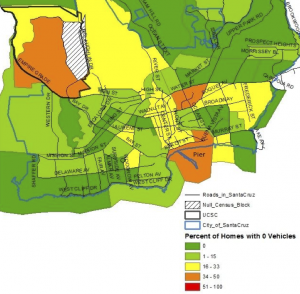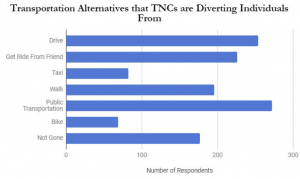Transportation Network Companies such as Uber and Lyft are growing rapidly on the UC Santa Cruz campus. They provide an option for students and other campus affiliates to forgo owning a car, but may also increase congestion and vehicle travel, and pose safety concerns through entering restricted areas and loading and unloading in bus stops, bike lanes and crosswalks. Lyndel Fusello’s report quantifies the extent of Uber and Lyft usage, and finds that nearly 40% of trips are substituting from buses, walking and cycling. Her recommendations are to improve transit service to better compete, geofence pick-up locations on campus, and promote shared rides through Uber Pool and Lyft Line. Read her report.
Monthly Archives: June 2018
More housing, less parking

The City of Santa Cruz typically requires at least one parking space, and often more, for every new housing unit. However, the analysis by Rylee Hawkins and Alex Garber found that many renters and homeowners own fewer cars than these parking requirements imply. Thus, parking requirements can increase the cost of housing and encourage car ownership. Read their report, and check out their website that highlights how students at UC Santa Cruz can get around without a car. (Dec 2017)
